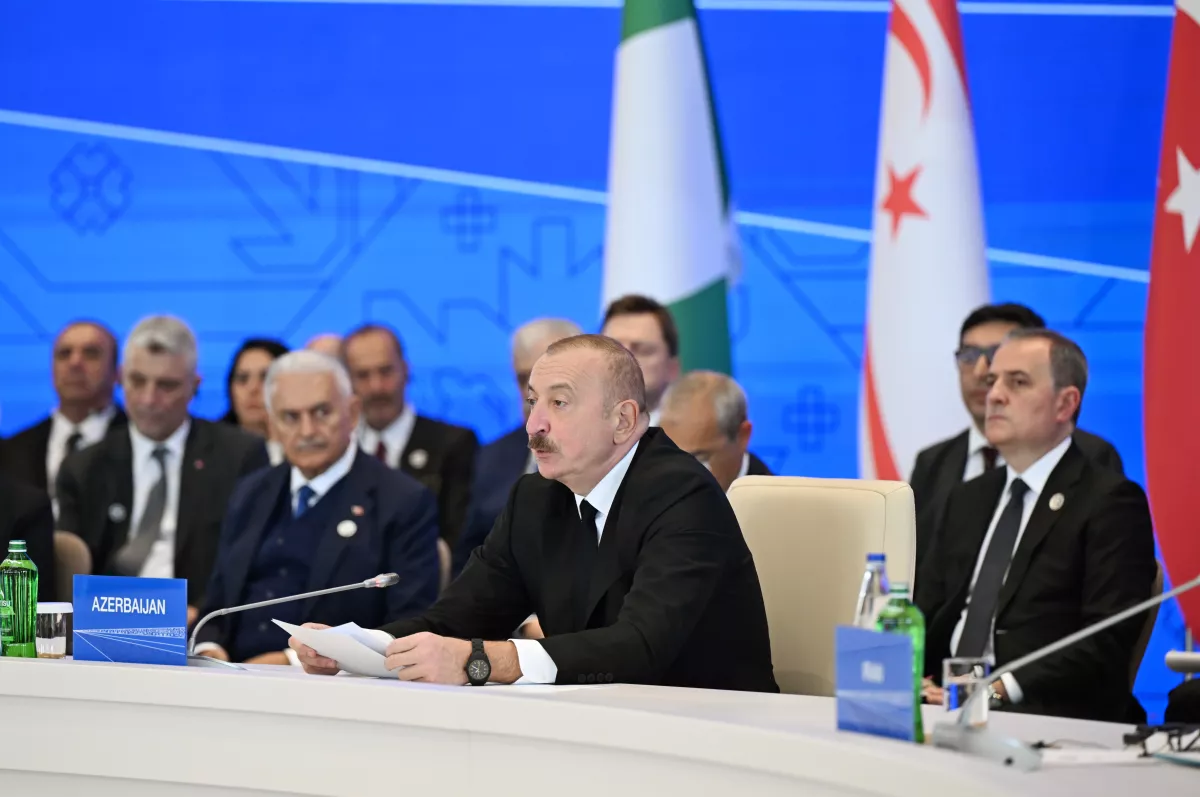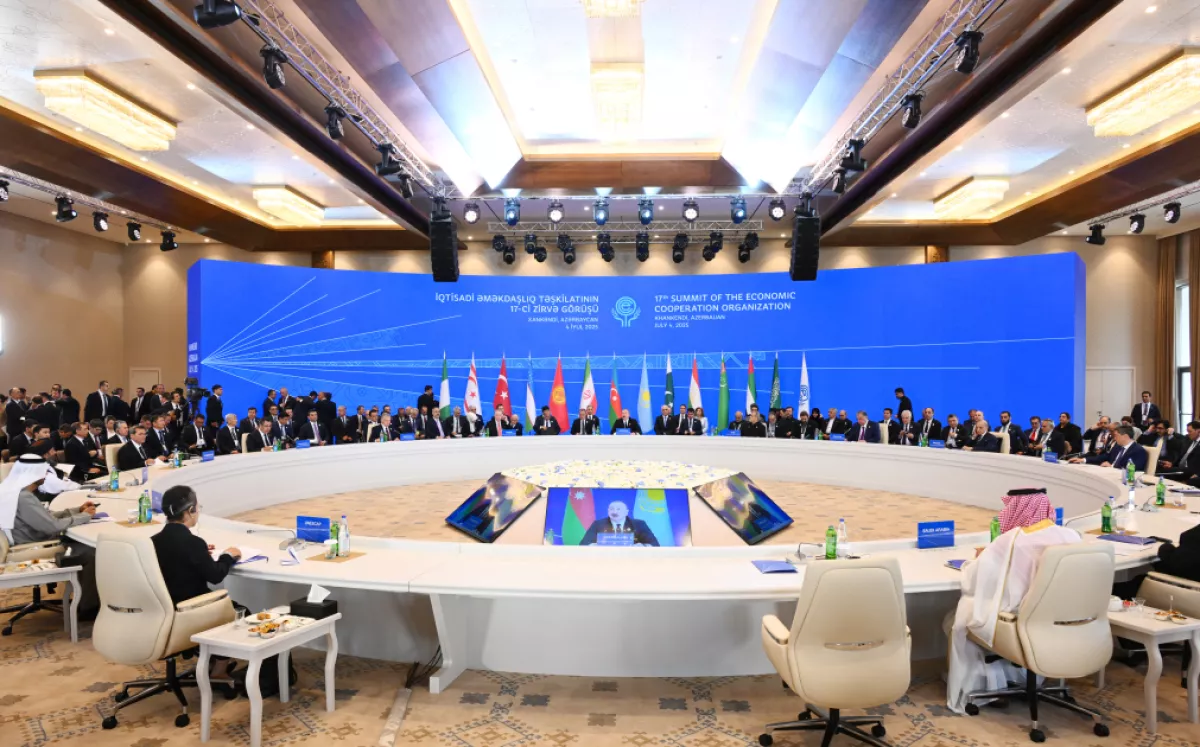Where the earth once burned, bridges are now being built An afterword to President Aliyev’s speech in Khankendi
For a long time, Khankendi was a symbol of pain and loss on the map of Azerbaijan. But today, this city has become a place where history, politics, and Azerbaijan’s new geopolitical code intertwine. Hosting the 17th Summit of the Economic Cooperation Organization right here — on land reclaimed from the darkness of three decades — is a clear message to the world.
In President Ilham Aliyev’s speech, delivered at the Congress Center in Khankendi, every sentence echoed a central refrain: Azerbaijan is restoring the liberated lands to their rightful role as the heart of the region — a centre of strength and influence.

Aliyev began by thanking Kazakhstan for its chairmanship of the ECO — a courteous remark that also carried an implicit message. Baku is ready to assume the role of an engine of integration, linking the interests of regional countries at the crossroads of East and West. He reminded the audience that this was already the third ECO summit hosted by Azerbaijan and emphasised the symbolism of the location — Khankendi stands as living testimony that history is returning to its rightful owners.
Reflecting on nearly thirty years of Armenian occupation, Aliyev spoke without bombast, yet with a cold, deliberate clarity aimed at both domestic and international audiences. He cited the facts of ethnic cleansing, the destruction of 65 mosques, the desecration of cemeteries, the planting of a million landmines, and over 400 civilian casualties caused by their explosions — figures that leave no room for speculation. Such a speech does more than recount the past; it lays the foundation for future legal and diplomatic arguments. Particularly noteworthy was the estimate of $150 billion in damages — a clear signal that Azerbaijan is prepared to raise the issue of reparations and accountability before international bodies.
But alongside the pain of the past, Aliyev also projected confidence in the future. He spoke of a large-scale return programme: 16 cities and villages have already welcomed back former internally displaced persons, and more than 50,000 people are now working and studying on the liberated lands. These are not just numbers — this is a story of revival, one that could serve as a model for the entire region, where frozen conflicts often seem hopeless.
Notably, Aliyev’s speech wove international political themes seamlessly into its fabric, turning it into a multilayered message aimed at several audiences. The President highlighted the recent decision by the Council of Foreign Ministers of the Organisation of Islamic Cooperation (OIC) in Istanbul, which supported the right of Azerbaijanis to return to their historical lands within present-day Armenia. This is a clear signal that Baku intends to continue raising the issue of the forcibly displaced Azerbaijanis in international forums and to pursue justice through exclusively peaceful, legal, and political means. In doing so, Azerbaijan is helping to shape a broader process — one that seeks to enshrine the issue of deportations as a recognised and integral part of regional conflict resolution in international law.
A key focus of the President’s speech was the climate and energy agenda. As the host country of COP29, Azerbaijan has successfully positioned itself as a driving force of ecological transformation for the developing world. Aliyev recalled the agreement reached in Baku to triple climate financing from $100 to $300 billion — a move that has undoubtedly strengthened the country’s diplomatic standing on the global stage. At the same time, he highlighted Azerbaijan’s achievements as an energy hub: $350 billion in investments over the past two decades, half of which came from foreign sources; gas exports to 12 countries; and a pivotal role in the East–West and North–South transport corridors. This portion of the speech was clearly aimed at regional business elites and international investors, serving as an open invitation to help shape a new geo-economic landscape.
Equally important was the emphasis on cultural diplomacy. Recent events — a business forum in Shusha, a youth forum in Aghdam, and a women’s forum in Lachin — are helping to redefine Karabakh not as a battlefield, but as a venue for civilisational dialogue. The decision to name Shusha the ECO tourism capital for 2026 fits squarely within this vision: transforming a symbol of war into a beacon of creation.

The structure of Aliyev’s speech was carefully calibrated and multilayered: domestic messages of restoration and return stood alongside external signals of Azerbaijan’s readiness for integration and leadership. There was diplomatic finesse in this balance.
In conclusion, Aliyev expressed confidence in the fruitfulness of the summit discussions — a formal phrase, yet one that carried deeper meaning. Baku is not merely inviting dialogue; it is shaping the agenda.
Today, Khankendi stands as a symbol of a new era, where history and politics converge into a unified core. President Ilham Aliyev’s speech within the walls of the Congress Center resonated as an invitation — to those willing to help build a future based on justice and mutual respect.








